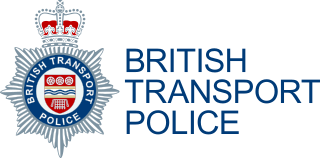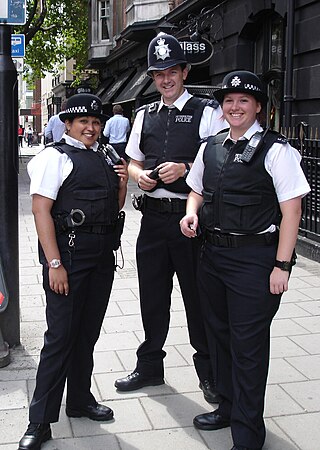Related Research Articles

An arrest is the act of apprehending and taking a person into custody, usually because the person has been suspected of or observed committing a crime. After being taken into custody, the person can be questioned further and/or charged. An arrest is a procedure in a criminal justice system, sometimes it is also done after a court warrant for the arrest.
A citizen's arrest is an arrest made by a private citizen – that is, a person who is not acting as a sworn law-enforcement official. In common law jurisdictions, the practice dates back to medieval England and the English common law, in which sheriffs encouraged ordinary citizens to help apprehend law breakers.

British Transport Police is a national special police force that polices the railway network of England, Wales and Scotland. The force polices more than 10,000 miles of track and more than 3,000 stations and depots.

Law enforcement in the United Kingdom is organised separately in each of the legal systems of the United Kingdom: England and Wales, Scotland, and Northern Ireland. Most law enforcement duties are carried out by those who hold the office of police constable of a territorial police force.

A tipstaff is an officer of a court or, in some countries, a law clerk to a judge. The duties of the position vary from country to country. It is also the name of a symbolic rod, which represents the authority of the tipstaff or other officials such as senior police officers.
A Police Community Support Officer, or as written in legislation Community Support Officer, is a uniformed member of police staff in England and Wales, a role created by Section 38(2) of the Police Reform Act 2002, which was given Royal Assent by Queen Elizabeth II on 24 July 2002. They are not warranted, but hold a variety of police powers and the power of a constable in various instances by the forty-three territorial police forces in England and Wales and the British Transport Police.

The Police and Criminal Evidence Act 1984 (PACE) is an Act of Parliament which instituted a legislative framework for the powers of police officers in England and Wales to combat crime, and provided codes of practice for the exercise of those powers. Part VI of PACE required the Home Secretary to issue Codes of Practice governing police powers. The aim of PACE is to establish a balance between the powers of the police in England and Wales and the rights and freedoms of the public. Equivalent provision is made for Northern Ireland by the Police and Criminal Evidence Order 1989 (SI 1989/1341). The equivalent in Scots Law is the Criminal Procedure (Scotland) Act 1995.
The power of arrest is a mandate given by a central authority that allows an individual to remove a criminal's liberty. The power of arrest can also be used to protect a person, or persons from harm or to protect damage to property.

The Criminal Law Act 1955 is a Singapore statute that, among other things, allows the executive branch of the Government of Singapore to order that suspected criminals be detained without trial. It was introduced in 1955 during the colonial era and intended to be a temporary measure, but has since been renewed continuously; the Government has declined to make it permanent, claiming it "believe[s] that the Act should be explicitly extended by Parliament every five years". The validity of the Act was most recently extended in February 2018, and it will remain in force till October 2024.
In English law, an appropriate adult is a parent, guardian or social worker; or if no person matching this is available, any responsible person over 18. The term was introduced as part of the policing reforms in the Police and Criminal Evidence Act 1984 and applies in England and Wales.

A custody suite is an area within a police station in the United Kingdom designed and adapted to process and detain those who have been arrested, or who are there for purposes such as answering bail.
A custody officer is an attested constable, in the United Kingdom and in the United States who works in a custody suite. A custody officer is in charge of the protection and transportation of detainees and/ or prisoners between a jail or prison and court. Most custody officers in the United States are also limited commissioned law enforcement officers and can only enforce the laws that directly pertain to custody enforcement.
An immigration officer is a law enforcement official whose job is to ensure that immigration legislation is enforced. This can cover the rules of entry for visa applicants, foreign nationals or those seeking asylum at the border, detecting and apprehending those that have breached the border and removing them, or pursuing those in breach of immigration and criminal laws.
Civilian enforcement officers (CEOs) are either employees or authorised officers of His Majesty's Courts & Tribunals Service and are responsible for enforcing magistrates' court orders. They can seize and sell goods to recover money owed under a fine and community penalty notice. They also execute, in England and Wales, warrants of arrest, committal, detention and distraint. Members of approved enforcement agencies have the same powers as civilian enforcement officers, but are employed by private companies. Both are referred to as 'authorised officers' in law.
The powers of the police in Scotland, as with much of Scots law, are based on mixed elements of statute law and common law.
The powers of the police in England and Wales are defined largely by statute law, with the main sources of power being the Police and Criminal Evidence Act 1984 and the Police Act 1996. This article covers the powers of police officers of territorial police forces only, but a police officer in one of the UK's special police forces can utilise extended jurisdiction powers outside of their normal jurisdiction in certain defined situations as set out in statute. In law, police powers are given to constables. All police officers in England and Wales are "constables" in law whatever their rank. Certain police powers are also available to a limited extent to police community support officers and other non warranted positions such as police civilian investigators or designated detention officers employed by some police forces even though they are not constables.
An independent custody visitor is someone who visits people who are detained in police stations in the United Kingdom to ensure that they are being treated properly. Prisoner escort and custody lay observers carry out a similar function in relation to the escort of prisoners from one place to another, or their custody at court.
In Australian criminal law, reasonable and probable grounds most prominently regulates police officers as a precondition of the exercise of certain powers in their function as enforcers of the law. Based on Australian common law, it is a prerequisite of most police powers. In Canada, it is defined as the point where probability replaces suspicion based on a reasonable belief; reasonableness is a legitimate expectation in the existence of specific facts, and the belief in individual circumstances can be "reasonable without being probable." Less-clearly defined in Australia, it depends on the circumstances of a case and often involves an assessment of the circumstances of a potential crime.

The Criminal Justice (Scotland) Act 2016 is an Act of the Scottish Parliament which reformed criminal practice and procedure in Scotland. The act was intended to "modernise and enhance the efficiency of the Scottish criminal justice system".
References
- ↑ "Police Reform Act 2002". archive.vn. 2012-08-05. Archived from the original on 2012-08-05. Retrieved 2021-01-23.
- ↑ "Police Reform Act 2002". archive.vn. 2012-08-05. Archived from the original on 2012-08-05. Retrieved 2021-01-23.
- ↑ "Queen's Printer for Scotland". Archived from the original on 2018-12-29.
- ↑ "Police (Northern Ireland) Act 2003". archive.vn. 2012-12-24. Archived from the original on 2012-12-24. Retrieved 2021-01-23.